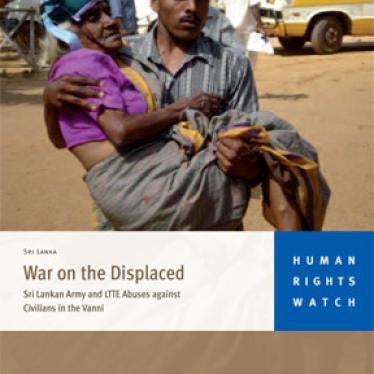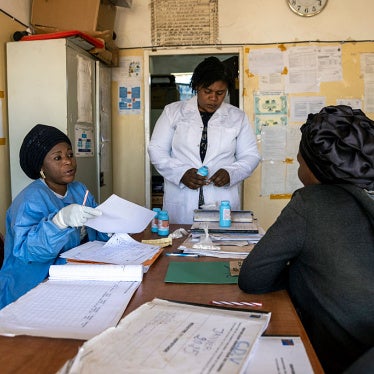(New York) - The Sri Lankan government and the separatist Liberation Tigers of Tamil Eelam (LTTE) should immediately agree to a plan of action to allow civilians trapped in the Vanni to leave the conflict area, Human Rights Watch said today. Some 150,000 civilians are at grave risk from fighting and aid shortages in the shrinking war zone in northeast Sri Lanka.
"A humanitarian evacuation of civilians is desperately needed right now," said Brad Adams, Asia director at Human Rights Watch. "Sri Lanka should urgently work with concerned governments to help civilians flee the fighting."
Human Rights Watch called upon both the Sri Lankan armed forces and the LTTE to abide by their obligations under international humanitarian law by taking all necessary steps to permit the evacuation of civilians and allowing humanitarian aid to reach the population in need. Over the past two months, more than 2,000 civilians have been killed in the conflict and thousands more injured.
The International Committee of the Red Cross (ICRC), which in the last three weeks ferried some 2,400 civilians from the combat zone, also called today for the evacuation of civilians and for more aid to be allowed in. Jacques de Maio, ICRC head of operations for South Asia, said in a statement that the situation was "one of the most disastrous" he had experienced. "Yet it would be possible to avoid further unnecessary suffering and death by allowing civilians who want to leave to get out of the area," he said.
Describing the situation as an "unfolding humanitarian catastrophe," the United Nations said today that civilians trapped in the war zone in northern Sri Lanka are dying because they lack food and medicine. "Deaths associated with a lack of food have become a reality," a UN spokesman, Gordon Weiss, told the media. "A shortage of medicine led to the deaths of nine children who had preventable diseases such as pneumonia and meningitis in late February."
The Sri Lankan government's decision in September 2008 to ban most humanitarian agencies from operating in the Vanni has exacerbated the plight of civilians. Humanitarian convoys cannot reach thousands of civilians in need. For instance, the international medical organization Médecins Sans Frontières (Doctors Without Borders) has teams of doctors and equipment standing by to provide life-saving assistance, but the government has continued to refuse them access to the region.
Human Rights Watch has criticized both Sri Lankan government forces and the LTTE for serious violations of international humanitarian law during the recent fighting. In addition to preventing civilians from leaving combat zones, the LTTE has deployed their forces close to civilians, thus using them as "human shields," fired upon civilians trying to flee to government-controlled areas, and recruited children for their forces.
The Sri Lankan armed forces have repeatedly and indiscriminately fired artillery at densely populated areas, including unilaterally declared "safe zones" and hospitals. Government statements have suggested that all ethnic Tamils who remain in LTTE-controlled areas are combatants, effectively giving a go-ahead for unlawful attacks.
"The world is watching as a humanitarian disaster unfolds in Sri Lanka," said Adams. "The UN and concerned governments should step forward to help prevent needless civilian deaths in Sri Lanka."







